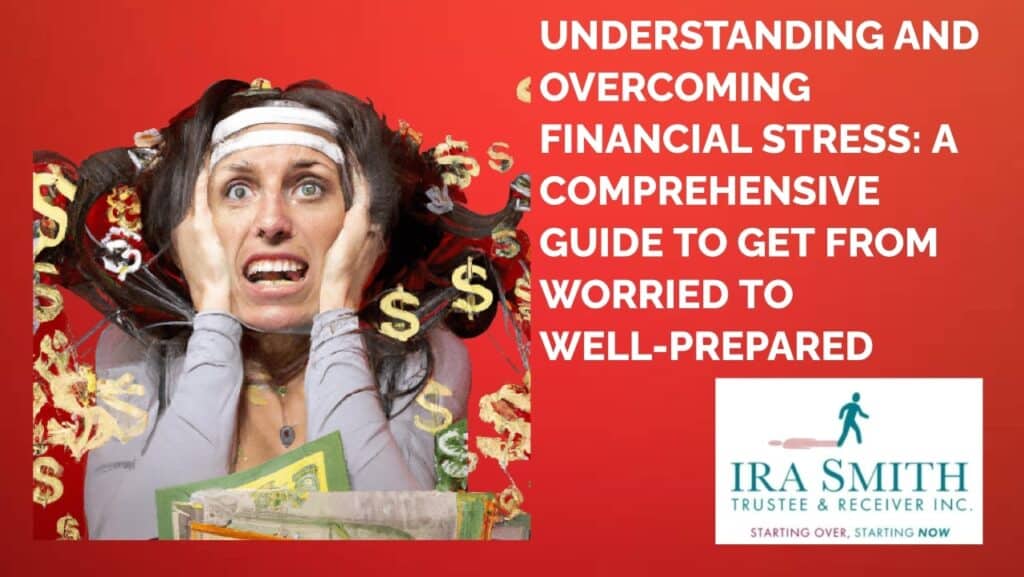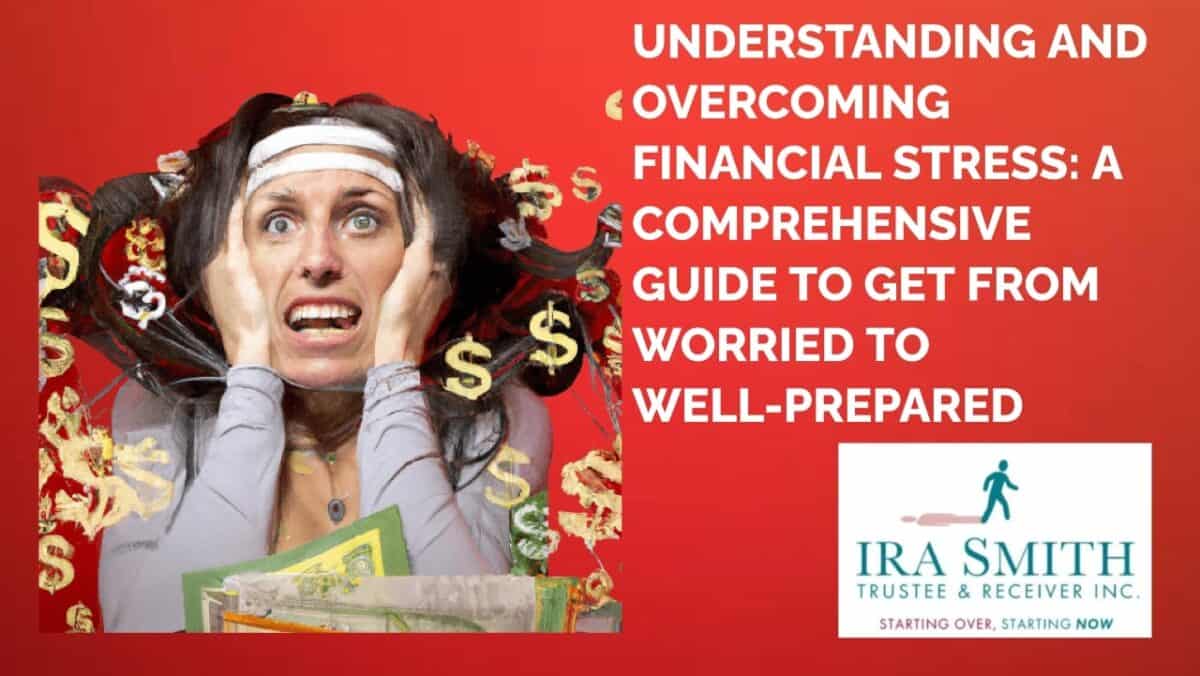Financial stress introduction
Financial stress and anxiety are an undeniable reality as well as a major source of anxiety for many people in Canada, as the expenses of a living surge, incomes stay stationary, and financial debt gathers. This scenario can result in anxiousness, nights invested tossing and turning, and also physical health conditions. However, it’s vital to keep in mind that your life doesn’t have to be dictated by economic stress and anxiety. By employing ideal techniques and adopting the ideal attitude, you can seize control of your funds and also alleviate the worry that accompanies them.
Within this Brandon’s Blog, I offer the recent findings of the FP Canada ™ 2023 Financial Stress Index, along with techniques for managing and surmounting financial stress. You’ll run into functional guidelines and also expert support that will certainly encourage you to take back command of your financial resources and obtain tranquillity of mind. Whether you’re coming to grips with cash worries and financial difficulties or endeavouring to enhance your financial stability, this blog will certainly equip you with the tools and knowledge needed for triumph. Allow us to start an expert voyage to dominate economic anxiety and also stride toward a future of monetary safety and security.
Definition of financial stress
Financial stress is the psychological and emotional concern experienced by people or families as a result of their financial situations. It arises from money worries when there is an inconsistency between a person’s funds and their financial obligations or ambitions, giving rise to feelings of nervousness, concern, as well as unpredictability concerning money matters.
The origins of financial stress can be credited to different factors, including considerable levels of financial debt, limited earnings, joblessness or underemployment, unexpected costs, medical bills, not enough financial savings, or the failure to fulfill financial objectives. It can impact individuals from all walks of life, regardless of their income level or socioeconomic status.
Financial stress and illnesses
In February 2022, I wrote the blog “WHAT PERCENTAGE OF ILLNESSES ARE DIRECTLY OR INDIRECTLY CAUSED BY FINANCIAL STRESS? FINANCIAL STRESS IS THE MOST COMMON OF ALL TRIGGERS”. In that Brandon’s Blog, I delved into the significant impact that financial strain and money worries can have on the onset and progression of various health issues, ranging from common tension headaches to more severe conditions such as cancer.
The symptoms of monetary anxiety can materialize in different methods, consisting of:
- Consistent worrying about money matters, such as expenses, loans, or future financial stability.
- Trouble sleeping or sleeplessness as a result of money issues.
- Feeling overloaded or powerless regarding one’s financial scenario.
- Strained connections, disputes, or stress with family members or friends because of financial problems.
- Avoiding or ignoring financial problems, which can lead to further issues.
- Physical symptoms and signs like headaches, tiredness, high blood pressure or stomachaches because of financial stress and anxiety.
- Increasing degrees of chronic stress, anxiety, clinical depression, or various other mental health challenges
- and other wellness problems.
- Difficulty focusing or reduced performance at work due to financial concerns.
The serious impact of financial stress can significantly disrupt an individual’s holistic well-being. It has the potential to influence one’s mental and physical health, interpersonal connections, occupational performance, and the overall essence of life. Moreover, it may initiate a recurring pattern of economic hardships, as anxiety can impair the capacity to make sound decisions and prevent efficient financial strategizing.
To effectively handle the burden of financial stress, it is crucial to devise and execute well-rounded approaches. These approaches could encompass devising a budget for your household, trimming unnecessary expenditures, exploring diverse income sources, seeking advice from financial professionals, and diligently building a financial cushion through consistent savings. Moreover, giving utmost priority to self-care is immensely significant. This may entail reaching out to reliable confidants for support and adopting stress-reducing methods that target the psychological impact of enduring financial difficulties as time goes by.
Without a doubt, the undeniable impact of financial stress affects many people and their families. However, by acknowledging that you are not the only one and actively taking steps to reduce its perilous consequences, one can emerge victorious and steer toward a path of enhanced financial well-being.
The FP Canada™ 2023 Financial Stress Index results
On June 15, 2023, FP Canada™ published its 2023 Financial Stress Index. The purpose is to gain insights into the factors that cause Canadians’ financial stress and how professionals can help Canadians overcome the stress brought on by their financial issues and improve their quality of life through better financial literacy and sound money management principles.
The latest Financial Stress Index findings show that inflation’s impact on the costs of goods and services, and elevated gas and grocery prices specifically, are out of all possible sources of stress, the one that is contributing the most to Canadians’ financial stress. As Canadians struggle to afford groceries, gas and other goods and services, nearly half (48%) have less disposable income compared to a year ago, a substantial increase from 2022 (39%).
Further, Canadians say they are struggling to save money. Saving enough for retirement (35%) and saving for a major purchase (32%) are two areas of growing concern. Younger generations are also more likely to feel the pinch, and Canadians aged 18-34 are the most concerned about saving for major purchases (50%).
Importance of financial wellness
Nowadays, the importance of money administration and financial wellness has never been more pivotal. With the perpetually escalating cost of existence and the unpredictability of the fiscal panorama, it has become crucial that we embrace responsibility for our finances and guarantee our economic steadiness. Financial well-being is a fundamental facet of overall welfare and is the key to a satisfied and pressure-free existence. This requires making knowledgeable and perceptive fiscal judgments, establishing realistic financial aspirations, and devising a budget that is customized to your necessities.
Obtaining and also maintaining a state of financial security includes more than simply generating wealth. It demands a thorough approach to money administration that involves thoroughly inspecting your financial situation, developing a detailed approach, and actively pursuing properly stated goals. This method additionally entails supporting sensible financial practices that cultivate security and lead you on the path toward withstanding and also lasting success over time.
How to Overcome Financial Stress
What is the cause of your financial stress?
In the middle of the current world of rapidity and dynamism, financial stress has gained extensive acknowledgment as a pressing concern affecting many individuals. Whether you are overcome with seemingly insurmountable financial debts, just barely surviving paycheque-to-paycheque, or constantly plagued by anxiety over financial issues, such stress factors cause significant damage to your well-being.
To effectively navigate the complexities of financial stress, it is imperative to embark upon the initial stage of discerning the underlying origins of this stress. It may arise from excessive expenditure exceeding one’s earnings, inadequate income to meet fundamental necessities, uncertainties surrounding employment, insufficient savings, the volatility of markets, or unexpected expenditures.
Establishing a robust financial foundation necessitates undertaking pragmatic endeavours, such as delineating precise financial objectives, formulating a budgetary framework, and fostering constructive monetary practices. Identifying the fundamental catalysts of your financial burdens holds the key to implementing attainable strategies that can pave the way toward a more financially stable future and, ultimately, instill a sense of tranquillity.
Create a budget and stick to it
Managing your finances on a tight budget can prove to be quite a challenge, and it often leads to feelings of stress and strain. Financial stress has the potential to cause a range of negative consequences, including strains in relationships, issues with both physical and mental health issues, and even a decline in productivity at work.
To steer clear of these problems, the best approach is to develop a budget and adhere to it diligently. A budget serves as a financial roadmap, outlining the amount of money you have coming in and the amount you have going out. It’s a powerful tool that aids in the management of your finances, enabling you to prioritize your spending and save for the future.
If you find yourself grappling with financial difficulties, barely making ends meet from one paycheque to another, or simply aspiring to enhance your financial fitness, a financial budget is an invaluable asset. Essentially, a budget acts as a comprehensive blueprint for your finances, mapping out your earnings and expenditures while imposing certain constraints on your spending across different categories.
By establishing a budget, you can gain a clear understanding of your financial situation and identify areas where you can cut back and save money. Adhering to your budget helps you steer clear of overspending and accumulating debt, ultimately relieving financial stress and enhancing your overall financial well-being.
Creating a budget lays the foundation for financial stability and represents a crucial step toward overcoming financial stress. With a budget in place, it becomes easier to devise a plan for repaying debts and setting realistic long-term financial goals. However, bear in mind that crafting a budget is merely the initial stride. Sticking to it demands discipline and regular review to ensure you stay on course. A seasoned financial advisor can offer tailored advice and an effective strategy to help you remain on budget and achieve financial success.
Prioritize debt repayment
Establishing a well-thought-out technique for dealing with financial debt payments can be highly effective in handling and getting over financial stress. It is critical to focus on debts with higher rates of interest first to fully pay them off first. By adopting this technique, the total interest problem is decreased, and the rate of getting rid of financial debt is increased.
Equally substantial is creating a monthly payments strategy that sets regular monthly targets vigilantly and stays with them with resolution. Furthermore, discovering options such as debt consolidation loans, negotiating with creditors, or getting help from an accredited non-profit credit counselling agency in your local community all need to be considered.
Constantly applying these methods empowers individuals to regain control of their financial situation and reduce and ultimately wipe away money stress.
Build an emergency fund
Determining the optimal level for your savings in case of emergencies is extremely important. As previously suggested by Brandon’s Blogs, it is advisable to possess a reserve amounting to three to six months’ worth of your family’s expenses. Precisely calculating your monthly expenditures at home plays a pivotal role in identifying the appropriate sum to allocate for unforeseen circumstances.
Taking the crucial step of opening a separate account that accrues interest solely dedicated to your emergency savings is highly recommended. It is imperative to refrain from withdrawing from this account unless it becomes necessary. By doing so, you enhance your capability to handle any unexpected costs that may arise. It is of utmost significance to perceive this account as a safety net of last resort rather than utilizing it as a regular source of funds.
Incorporating the practice of automatic payments constitutes another effective technique. You have the option to establish regular transfers from your primary account to the interest-earning fund of your emergency savings. This ensures that you consistently contribute to your emergency fund without the requirement of constant monitoring. It is a reliable approach to steadily building up your financial safety net.
Seek professional advice
When it comes to managing and overcoming financial stress, seeking professional financial advice can make all the difference. A trained financial professional can help you assess your financial situation, determine your exact level of financial difficulty, identify areas where you can make improvements, and develop a plan that will help you achieve your goals, achieve good financial health and live a more financially stable life.
Whether you’re dealing with debt, struggling to make ends meet, or simply want to take your finances to the next level, a financial advisor can offer the guidance and support you need to succeed. So don’t hesitate to reach out to a professional if you’re feeling stressed or overwhelmed – they’re there to help.
Financial stress: Common traps to avoid
Payday loans
Payday loans may appear to be a convenient option when faced with unexpected expenses or financial emergencies. However, it’s essential to recognize that these short-term loans often carry exorbitant interest rates and fees, which can trap borrowers in a cycle of debt. Before entering into any agreement, it is crucial to fully understand the terms and conditions associated with payday loans.
In reality, payday loans can have detrimental effects on your financial well-being. Instead, exploring alternative forms of financial assistance, such as low-interest credit cards or personal loans, might be a wiser choice. These options typically offer more favourable terms and can help you manage your financial situation without falling into a debt spiral.
To safeguard your financial health in the long run, it is advisable to establish a budget and build an emergency savings fund. By carefully managing your expenses and setting aside funds for unexpected circumstances, you can reduce the need for relying on payday loans in the future. Creating a financial safety net through savings provides greater stability and flexibility during challenging times.
Remember, the allure of quick cash from payday loans can be enticing, but the potential drawbacks and long-term consequences outweigh the short-term benefits. Prioritizing financial responsibility and exploring alternative avenues for assistance will contribute to your overall financial well-being and help you avoid the pitfalls associated with payday loans.
Credit card debt
Financial stress in Canada is a common issue, with credit card debt being a significant contributor. Many people are drawn to the convenience and rewards offered by credit cards, leading to overspending and a high accumulation of debt with steep interest rates. It is crucial to carefully plan and prioritize payments to avoid falling into the trap of owing money to credit card companies. Understanding the complex terms and conditions surrounding credit cards, such as payment deadlines and interest rates, can help individuals make informed financial decisions.
In addition, seeking guidance from a reputable financial advisor or community-based non-profit credit counselling services can provide valuable support and direction in managing credit card debt. By adopting effective strategies and practicing responsible fiscal habits, anyone has the potential to overcome credit card debt and achieve a state of financial stability and peace of mind.
Impulse spending
Impulse buying can quickly become a major contributor to financial stress. We’ve all experienced the temptation to purchase something we don’t need on a whim, only to regret it later when our finances suffer.
It’s important to recognize the role that emotions can play in our spending habits and to practice mindfulness when making purchasing decisions. By creating a budget, prioritizing our needs over our wants, and taking time to consider our purchases, we can avoid falling victim to impulse buying.
With discipline and self-control, we can regain control of our finances, reduce our stress levels, and achieve our financial goals.
Lack of financial education or financial literacy
One common trap that individuals fall into when it comes to financial stress is the lack of financial education. Many individuals simply do not have the knowledge or skills necessary to effectively manage their finances. An absence of proper financial education can lead to poor decisions when it comes to budgeting, saving, and investing, which can further contribute to financial stress.
It is crucial to seek out resources and education in this area to develop a strong foundation of financial literacy. By arming oneself with knowledge and skills, individuals can strengthen their financial position and alleviate the stress associated with concerns about money management.
Financial stress: The benefits of being financially prepared
Peace of mind
Being financially prepared generates a myriad of benefits, with the most remarkable among them being the extensive feeling of tranquillity that comes with the guarantee of your financial affairs being well-ordered. By taking charge of your financial situation, mastering the art of expense management, as well as having a detailed understanding of your financial objectives and the methods to attain them, you can escape the stress caused by unanticipated expenditures and the perpetual cycle of living from one paycheque to one more.
By using efficient methods and a diverse range of tools, people can create a durable framework for their fiscal future, thus instilling a feeling of steadfast security and fortified safety and security while doing so. Eventually, the reward of the peacefulness of the mind that accompanies financial readiness, enables people to relish life without the perpetual problem of financial worries.
Increased ability to handle emergencies
Being financially prepared means having the ability to handle unexpected emergencies without causing undue stress and anxiety. It’s important to establish an emergency fund as part of your financial plan. This fund should be easily accessible and able to cover at least three to six months of living expenses.
In the event of an emergency such as job loss or a medical issue, having an emergency fund can provide peace of mind and reduce financial stress. By prioritizing financial preparedness, you can feel confident in your ability to handle unexpected expenses and maintain your financial stability.
Improved credit score
You have the power to attain financial stability, and it all begins by constructing an extraordinary credit rating. A remarkable rating unlocks opportunities for loan and credit card approvals, favourable interest rates, and access to outstanding financial products.
Through the cultivation of astute financial practices and the alleviation of monetary burdens, you can propel your credit score to new heights. Keep a vigilant eye on your financial obligations, employ prudent credit card usage, and handle your credit responsibilities with diligence.
The ability to assume command over your financial circumstances resides deep within you. A robust credit score paves the path toward a brilliant and prosperous future. Place your trust in your capabilities, and take decisive action to accomplish financial triumph. The possibilities before you are limitless.
Financial stress: Conclusion
I hope you enjoyed this financial stress Brandon’s Blog. Financial stress is a growing concern in Canada, affecting individuals of all ages and income levels.
Creating a solid financial plan can be the key to unlocking a brighter and more successful future. By taking control of your finances, you can prioritize your expenses, set clear financial goals, and build a strong foundation for your dreams to come true. With the right mindset and approach, financial planning can empower you to regain control, eliminate this issue as a source of stress in your life and find peace of mind.
Individuals must take proactive measures to address financial difficulties and promptly seek assistance when necessary. It is crucial to recognize that financial stress is a prevalent concern and seeking help is a demonstration of fortitude, rather than vulnerability. Should you encounter challenges in managing your finances and find yourself burdened by stress, do not delay in pursuing aid.
Revenue and cash flow shortages are critical issues facing people, entrepreneurs and their companies and businesses that are in financial distress. Are you now worried about just how you or your business are going to survive? Are you worried about what your fiduciary obligations are and not sure if the decisions you are about to make are the correct ones to avoid personal liability? Those concerns are obviously on your mind.
The Ira Smith Team understands these concerns. More significantly, we know the requirements of the business owner or the individual that has way too much financial debt. You are trying to manage these difficult financial problems and you are understandably anxious.
It is not your fault you can’t fix this problem on your own. The pandemic has thrown everyone a curveball. We have not been trained to deal with this. You have only been taught the old ways. The old ways do not work anymore. The Ira Smith Team uses innovative and cutting-edge methodologies, to adeptly navigate you through the intricacies of your financial challenges, ensuring a resolution to your debt-related predicaments without resorting to the rigours of the bankruptcy process. We can get you debt relief now!
We have helped many entrepreneurs and their insolvent companies who thought that consulting with a Trustee and receiver meant their company would go bankrupt. On the contrary. We helped turn their companies around through financial restructuring.
We look at your whole circumstance and design a strategy that is as distinct as you are. We take the load off of your shoulders as part of the debt settlement strategy we will draft just for you.
The Ira Smith Trustee & Receiver Inc. team understands that people facing money problems require a lifeline. That is why we can establish a restructuring procedure for you and end the discomfort you feel.
Call us now for a no-cost consultation. We will listen to the unique issues facing you and provide you with practical and actionable ideas you can implement right away to end the pain points in your life, Starting Over, Starting Now.



